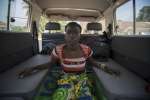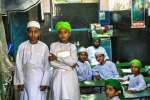- Text size
 |
|  |
|  |
| 
- Français
UNHCR urges CAR's warring sides to use Pope's visit to work for peace
Briefing Notes, 27 November 2015
This is a summary of what was said by UNHCR spokesperson Leo Dobbs – to whom quoted text may be attributed – at the press briefing, on 27 November 2015, at the Palais des Nations in Geneva.
UNHCR urges Central African Republic's warring groups to take the opportunity of Pope Francis's scheduled visit to Bangui this weekend to rebuild the national reconciliation process after a wave of violence that has triggered an 18 per cent increase in the number of people displaced within the country since September.
Although the situation in Bangui is currently calm but tense, we are concerned at the outbursts of violence in the country, which set back fragile efforts to restore a lasting peace and put planned elections in late December at risk.
The intra-communal fighting, starting in September and flaring up again in late October and November, left scores of people dead, hundreds of homes destroyed and more than 70,000 people displaced within CAR, reversing a pattern of returns seen in much of the country in the first nine months. Hundreds of people have also fled to Democratic Republic of the Congo since September.
The fighting has already caused one postponement in the presidential and legislative elections, from October 18 to December 27, as well as stoking the sectarian divide and inter-communal tensions.
At least 13 people died, including a UN peace-keeper, and hundreds were injured in November in the latest armed clashes in Bangui, Bambari and Batangafo, which included attacks on sites for internally displaced people. Some 800 IDP shelters and 120 houses were destroyed in Bangui neighbourhoods.
Those fleeing their homes have mostly hidden in the bush, fled to other sites or moved to the shelter of UN peace-keeping bases or compounds run by international humanitarian organizations. The number of internally displaced rose 18% from 378,400 in early September to 447,500 in November.
Central African refugees also continue to cross the Oubangui River into Democratic Republic of the Congo. During the first three weeks of November, UNHCR registered 1,236 refugees in Equateur province, most of them new arrivals and many were female-headed families.
Refugees told UNHCR they had fled reprisal attacks between armed groups, which also targeted the civilian population. Some reported that their houses had been destroyed, their property looted and family members killed.
Amid sporadic but disquieting reports this month of border incursions from CAR, some refugees have asked to move away from the border. A lack of funding is hampering UNHCR efforts to provide basic aid and relocate thousands of CAR refugees to safer areas.
The recent waves of displacement have created new needs for protection, emergency shelter, health care, psychosocial support as well as water and sanitation. In many cases, help has been difficult to provide because insecurity has made it difficult to get access to some areas – some displaced people remain without assistance for days. UNHCR is particularly alarmed at the situation of civilians in enclaves such as PK5 in Bangui, where people have been trapped with little access to aid since the September violence.
At the same time, humanitarian organizations have been increasingly targeted since September; at least 10 organizations have had their offices and warehouses looted and staff attacked. This is a worrying development and we reiterate earlier calls for guaranteed humanitarian access and for protection of aid workers as they try to reach the most vulnerable.
Most agencies remain operational, including UNHCR, which with its partners has provided aid to tens of thousands of newly displaced people in Bangui, Bambari and elsewhere, including tents and emergency shelters, tarpaulins, mats, blankets and kitchen kits. These distributions were however suspended following the outbreak of violence on October 26 in Bangui.
The recent instability is all the more disheartening because it came after relative peace appeared to be returning this year to CAR, especially in urban areas. Before the latest violence, the trends indicated that displaced people were going back to their homes. In Bangui, an estimated 24,000 people returned between January and early September. In Bangui's Mpoko airport site, the number of IDPs fell from 20,000 in December 2014 to 11,000 last August. Today, Mpoko hosts some 19,000 people.
Today, protection concerns include arbitrary arrests and illegal detention, torture, extortion, armed robbery, beatings, rape and other sexual violence, looting, arbitrary attacks on civilians, burning of villages, kidnapping, forced recruitment by armed group of children and others, restriction of movements.
On top of all this, the CAR crisis remains massively under-funded, with just 20% of funding received for projects in CAR and host countries (US$48.8 million out of US$241 million). Operations in CAR itself are better funded at 39% of the US$51 million sought. These gaps mean the support needed by hundreds of thousands of vulnerable people is not able to reach them.
For more information on this topic, please contact:
- In Geneva, Leo Dobbs on mobile +41 79 883 6347
- In Bangui (on mission in Geneva), Dalia Al Achi on mobile: +236 726 75186










































